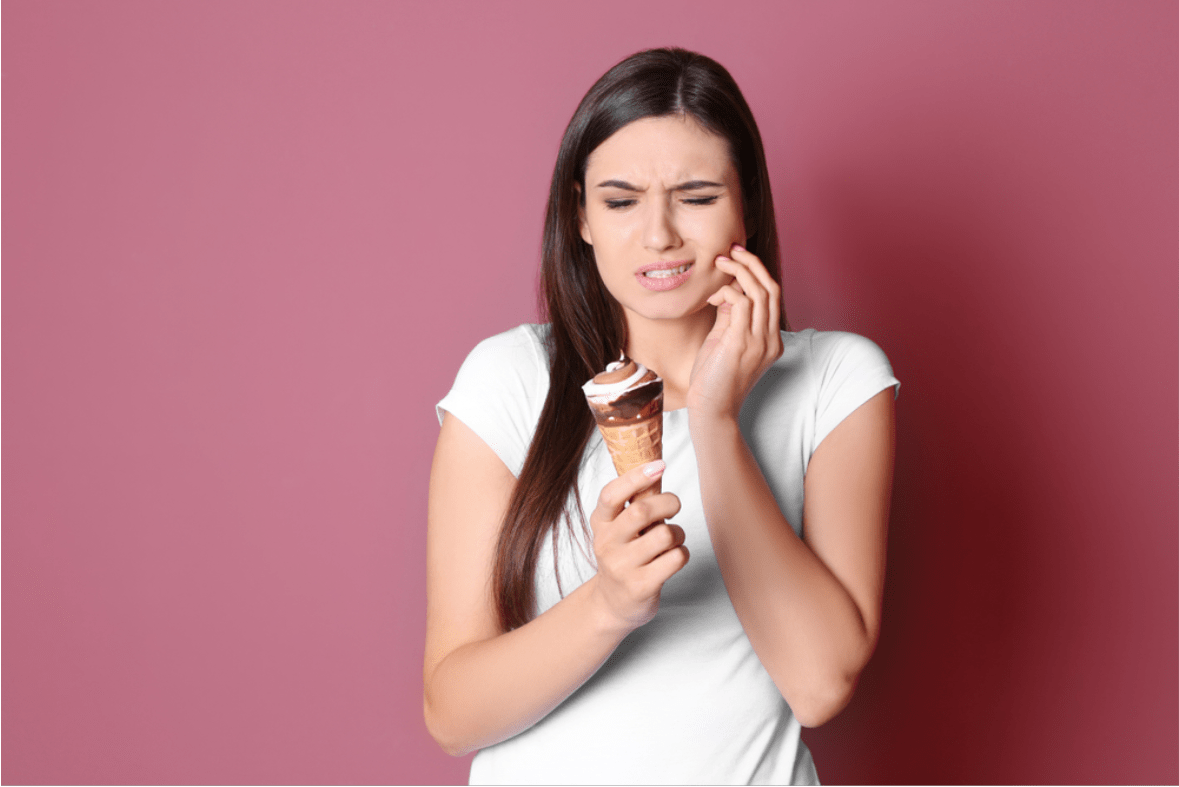Dentin hypersensitivity, also known as tooth sensitivity, is a condition that causes one or more teeth to become overly sensitive, often to temperature. Do you experience tooth pain when eating hot, cold, sweet or acidic foods or drinks? Or breathing in cold air? If so, you may have sensitive teeth. Tooth sensitivity is very common and may come and go over your lifetime.
At our Mona Vale dental practice, we have helped many patients reduce the discomfort caused by sensitive teeth. In this article, we explain why tooth sensitivity occurs, what causes it and how you can prevent and treat it.
What is Tooth Sensitivity?
The crown or top part of your tooth that is above your gum line has a protective layer of enamel. The roots below your gum line have a protective layer of cementum. The material beneath these protective layers is dentin, which is less dense.
Your teeth’s dentin is made up of dentin tubules which are like tiny tubes all bound together. When your teeth’s enamel or cementum gets damaged or worn, it exposes the dentin tubules. These dentin tubules, when exposed to hot or cold temperatures, cause the temperature change to reach the nerve faster. As a result, you experience pain and sensitivity.
Common Causes of Tooth Sensitivity
There are several reasons why your teeth may become sensitive. Some of the most common causes are:
Brushing Too Vigorously
If you brush your teeth with a lot of force, or with a hard-bristled toothbrush, you can wear down your enamel. Vigorous brushing can also do damage to your gums over time, causing them to recede. Receding gums expose your cementum which, once worn, exposes your dentin.
Tooth-Whitening Toothpaste
It’s not uncommon for toothpaste manufacturers to add tooth-whitening chemicals to their formulas. Some people are sensitive to these whitening agents. If you find your teeth have become sensitive after switching toothpaste, it could be as a result of these whitening chemicals.
Teeth Grinding (Bruxism)
Tooth enamel is extremely strong! But if you grind your teeth through the night, the ongoing pressure can eventually wear down your enamel, exposing the inner layer of your tooth/teeth.
Gum Disease
Poor oral health may lead to gum disease which can affect the sensitivity of your teeth. If you’re suffering from gum disease, your gums are likely to be inflamed and swollen, pulling away from your teeth. This may then cause the root surfaces to be exposed and put your cementum at risk of wear.
Plaque Build-Up
The bacteria in your mouth, if left to linger, builds up on your teeth in the form of plaque. When plaque builds up on your teeth and around your gum line, the bacteria in it can start to eat away at your enamel causing decay. Daily brushing and flossing help prevent the build-up of plaque. This also reduces your risk of gum disease – another cause of tooth sensitivity.
A Recent Dental Procedure
It’s common to experience tooth sensitivity after various dental treatments. These treatments may include a dental filling, clean, or teeth whitening, for example. Tooth sensitivity as a result of dental treatment is usually mild and short-lived.
Consuming Acidic Foods & Beverages
Sugar isn’t the only culprit when it comes to doing damage to your smile. Foods and drinks that are high in acids eat away the enamel on your teeth. Citrus fruits, carbonated drinks and sour lollies are particularly high in acid. If consumed frequently, this acid can do permanent damage to your teeth.
A Cracked or Chipped Tooth
If a crack or chip in your tooth is big enough to expose the inner layers of your tooth, you may experience tooth sensitivity. If you have a chip or crack in your tooth that isn’t causing you issues, it’s still important to seek dental treatment. A crack or chip in your tooth can grow over time and lead to discomfort and the need for major dental treatment in the future.
Preventing and Treating Tooth Sensitivity
At our family dentist in Mona Vale, we understand the discomfort that tooth sensitivity can create. You don’t have to put up with the pain though. We can help you! Here are some pointers for preventing and treating tooth sensitivity:
Maintain Regular Dental Check-Ups
Maintaining regular and ongoing dental check-ups is key to preventing tooth sensitivity. These routine check-ups allow us to monitor your oral health and treat any potential dental issues that could lead to sensitive teeth, early on. They also allow you to have a professional clean during which any plaque or tartar build-up can be removed.
If you are suffering from tooth sensitivity, you must seek dental advice as it may be a sign of tooth decay or gum disease, for example. Dental issues like these need dental treatment.
Be Gentle
Maintaining a great oral hygiene routine is important. But harder, doesn’t mean better. Be gentle when cleaning your teeth and gums. Ensure that you brush your teeth gently, in small circular motions, with limited pressure. Electric toothbrushes are great for promoting the correct tooth brushing technique. It’s important to remember though, the electric toothbrush does the work for you. So, there’s no need to scrub! If using a manual toothbrush, be sure to use a soft-bristled one.
Use A Toothpaste For Sensitive Teeth
Using a toothpaste for sensitive teeth can help reduce and prevent tooth sensitivity. Toothpaste for sensitive teeth can help block the ends of the exposed dentin tubules helping to reduce sensitivity. Most toothpaste for sensitive teeth contains fluoride. This ingredient helps strengthen your enamel and protect your teeth against decay.
Protect Your Teeth From Night Grinding (Bruxism)
Do you suffer from bruxism? Our dentists can provide a custom-made splint for you to wear at night. It is made to fit, offering you better protection and comfort than store-bought versions. Wearing a splint during the night doesn’t stop you from grinding your teeth. However, it provides a protective barrier between your teeth.
Reduce Your Consumption of Acid Foods & Drinks
When it comes to citrus or citrus-flavoured, carbonated or sour foods and drinks, it’s best to limit your consumption. It can also help to rinse your mouth out with water after consuming these types of foods or beverages. Doing this reduces the amount of acid left to linger on your teeth.
Family Dentist in Mona Vale
If you have sensitive teeth or any other oral health concerns, our family-friendly dental practice in Mona Vale is here to help you. Our gentle dental team has a lot of experience in working with patients of all ages. We love welcoming new patients to our practice.
At Beaches Dental Mona Vale, we have a common goal – to help you and your loved ones achieve your best possible oral health.
Are you overdue for a dental check-up? Contact us to book an appointment.

